Researchers of the Month
Here are some of the graduating seniors we will miss. ...We wish them all well with
their future endeavors and pursuits!
May 2015
David Chen - Biochemistry Major - Research Mentor: Dr. Nancy Hollingsworth, Biochemistry & Cell Biology
Michael Colbert - Atmospheric & Oceanic Sciences Major - Research Mentor: Dr. Brian Colle, School of Marine & Atmospheric Sciences
Cassandra Dix - Biochemistry Major - Research Mentor: Dr. Kevin Czaplinski, Biochemistry & Cell Biology
Julia Joseph - Biochemistry major - Research Mentor: Dr. Jessica Seeliger, Pharmacological Sciences
Sai Saroja Kolluru - Psychology major - Research Mentor: Dr. Yusuf Hannun, Medicine, SB Cancer Center
Juan Mesa - Mechanical Engineering Major - Research Mentor: Dr. Noah Machtay, Henry Honigman, Mechanical Engineering
Marina Mestres - CME major- Research Mentor: Dr. Miriam Rafailovich, Materials Science & Engineering
Janagan Naahanathan - Biology Major - Research Mentor: Dr. Isaac Carrico, Chemistry
Stacey Rice - Geosciences major - Research Mentor: Dr. Troy Rasbury, Geosciences
Samuel Rind - Physics Major - Research Mentor: Dr. Eden Figueroa, Physics & Astronomy
Matthew Sacco - English Major- Research Mentors: Dr. Gallya Lahav, Political Science; Dr. Peter Manning, English
Jacquelyn Taylor - Psychology Major- Research Mentor: Dr. Sharon Pochron, Sustainability Studies
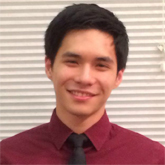
David Chen is a Biochemistry major in the University Scholars program. He joined the Hollingsworth lab in April 2013, and recently presented a poster at the URECA poster symposium titled "Is NDT80 Induction Sufficient for Rad51-mediated Intersister Repair?" His research in summer 2014 was supported with a URECA-Biology Alumni Research (U-Bar) award. In addition to research, David has been involved with Stony Brook Crew (2011-2012), served as a Hall Council Treasurer, a Spirit and Pride Representative, a Hospital Volunteer in Radiology, and a Medications Coordinator for Stony Brook Global Medical Brigade. He was also a TA for Organic Chemistry in the 2013-2014 year. David will be attending Cornell Medical College (Class of 2019).
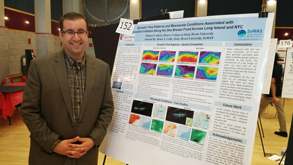 Michael Colbert is an Atmospheric and Oceanic Sciences major on the Meteorology track. Michael's
first research experience took place at Stony Brook University during the Doppler
Radar for Education and Mesoscale Studies (DREAMS) Project in 2013. Michael operated
a Doppler Radar on Wheels and took upper air observations during the project. In
the Summer of 2014, Michael took part in an REU at Colorado State University where
he studied Doppler radar detected precursors to lightning initiation in convective
storms. Michael presented the results of this project at the 2015 Northeastern Storms
Conference. Most recently, Michael has been working on an Honors College Senior Project
investigating the synoptic flow regimes and mesoscale features which support or inhibit
convection initiation along the sea breeze front across the NYC and Long Island region.
Michael has also served as the president of the Meteorology Club for the past three
years, coordinating efforts such as the installation of a weather station and web
camera atop the Health Sciences Center, collaboration between the School of Marine
and Atmospheric Sciences and the School of Journalism to create a broadcast meteorology
class, and the creation of a social media presence called SBUWeather which the Meteorology
Club uses to disseminate student-made weather forecasts and other important weather
information. In the Fall, Michael will be attending Penn State University to pursue
a Ph.D. in Meteorology.
Michael Colbert is an Atmospheric and Oceanic Sciences major on the Meteorology track. Michael's
first research experience took place at Stony Brook University during the Doppler
Radar for Education and Mesoscale Studies (DREAMS) Project in 2013. Michael operated
a Doppler Radar on Wheels and took upper air observations during the project. In
the Summer of 2014, Michael took part in an REU at Colorado State University where
he studied Doppler radar detected precursors to lightning initiation in convective
storms. Michael presented the results of this project at the 2015 Northeastern Storms
Conference. Most recently, Michael has been working on an Honors College Senior Project
investigating the synoptic flow regimes and mesoscale features which support or inhibit
convection initiation along the sea breeze front across the NYC and Long Island region.
Michael has also served as the president of the Meteorology Club for the past three
years, coordinating efforts such as the installation of a weather station and web
camera atop the Health Sciences Center, collaboration between the School of Marine
and Atmospheric Sciences and the School of Journalism to create a broadcast meteorology
class, and the creation of a social media presence called SBUWeather which the Meteorology
Club uses to disseminate student-made weather forecasts and other important weather
information. In the Fall, Michael will be attending Penn State University to pursue
a Ph.D. in Meteorology.
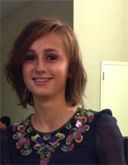 Cassandra Dix is a Biochemistry major, who has been involved with research in the Czaplinski lab
(Biochemistry & Cell Biology) since Fall 2013 and is currently writing an honors thesis
on "Neuregulin1-III Back-signaling in neurons". Cassandra was the recipient of Undergraduate Recognition Awards for Academic Excellence in 2014 and 2015; and was
selected for the America East Conference All-Academic Team in 2014 and 2015. She is
also a recipient of both the Chancellor’s and Provost’s award for Academic Excellence.
Cassandra is a member of the Stony Brook tennis team which has been honored as America
East Conference winners for women's tennis in 2013, 2014 and 2015; In addition, she
has volunteered with campus pantry food drives, helped with peer athlete advising,
and participated in Walk for Beauty and special Olympics bowling events. Cassandra
has also served as a TA for biochemistry. A resident of Stanwick, England, Cassandra
plans to return to her hometown following graduation, and will in the near future
be applying to graduate Ph.D. programs in a biochemistry-related field.
Cassandra Dix is a Biochemistry major, who has been involved with research in the Czaplinski lab
(Biochemistry & Cell Biology) since Fall 2013 and is currently writing an honors thesis
on "Neuregulin1-III Back-signaling in neurons". Cassandra was the recipient of Undergraduate Recognition Awards for Academic Excellence in 2014 and 2015; and was
selected for the America East Conference All-Academic Team in 2014 and 2015. She is
also a recipient of both the Chancellor’s and Provost’s award for Academic Excellence.
Cassandra is a member of the Stony Brook tennis team which has been honored as America
East Conference winners for women's tennis in 2013, 2014 and 2015; In addition, she
has volunteered with campus pantry food drives, helped with peer athlete advising,
and participated in Walk for Beauty and special Olympics bowling events. Cassandra
has also served as a TA for biochemistry. A resident of Stanwick, England, Cassandra
plans to return to her hometown following graduation, and will in the near future
be applying to graduate Ph.D. programs in a biochemistry-related field.
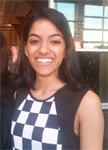
Julia Joseph is a Biochemistry major in the Women in Science & Engineering (WISE) program. She has been a member of the laboratory of Dr. Jessica Seeliger since summer 2012,
when she was awarded the URECA Biology Alumni Research (U-BAR) award to support her
research on Lipid-Protein Interactions in Mycobacterium tuberculosis. This work is
currently the subject of her honors thesis. Julia has presented her research on campus
at the URECA Celebration as well as the Columbia Undergraduate Science Journal Research
Symposium. Since fall 2013, Julia has been active as Editor-in-Chief of SBU’s Young
Investigators Review, putting her efforts into reinstating and expanding the university’s
undergraduate science journal. In summer 2014, she participated in the Summer Undergraduate
Research Fellowship (SURF) program at Rockefeller University, where she worked in
the St. Giles Laboratory of Human Genetics of Infectious Diseases. Julia has volunteered
with Alternative Spring Break Outreach and has served as Vice President of Planning
to Achieve Collegiate Excellence (PACE), a program with the purpose of encouraging
underprivileged youth to attend college. Julia is a member of Phi Beta Kappa, and
is a recipient of both the Chancellor’s and Provost’s award for Academic Excellence,
as well as the Undergraduate Recognition award for Academic Excellence. She plans
to pursue a career integrating research and medicine in the future.
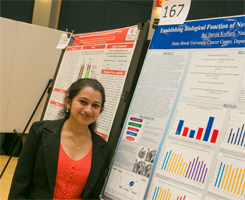
Sai Saroja Kolluru is a Psychology major who has actively been involved in research for the past four
years. She started her undergraduate research career by volunteering in two research
laboratories in the Department of Neurobiology and Behavior. Saroja became interested
in exploring the field of lipid cancer research and subsequently joined Dr. Yusuf
A. Hannun’s lab where for the past two and a half years she has been working directly
with Dr. Nadia A. Rana, a Post-Doctoral Research Assistant, on “Establishing the Biological
Function of Novel Sphingolipids in Saccharomyces cerevisiae.” Her project investigates the interconnection between amino acid metabolism and sphingolipid
biosynthesis. After graduation, Saroja is going to continue working in Dr. Hannun’s
Lab as a research assistant. Saroja has served as the President of Hindu Students
Council for the past two years, as a Volunteer Coordinator for Psychology Student
Alliance and was a co-founder of Taandava, a Premiere Indian Classical Dance Team
at Stony Brook. In the future, she aspires to be a physician and hopes to continue
doing research.
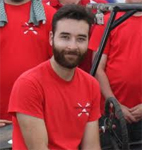 Juan Mesa is a mechanical engineering major. He currently works as a student assistant for
the Undergraduate College Centers as well as a student assistant for the Mechanical
Engineering department in the Manufacturing Processes Laboratory. Juan is the current
President and control systems leader of the Stony Brook Motorsports team, where he
has held various leadership positions over the last 3 years. This spring Juan was
honored with an Undergraduate Recognition Award in Leadership for his contributions
to the Stony Brook Motorsports team.
Juan Mesa is a mechanical engineering major. He currently works as a student assistant for
the Undergraduate College Centers as well as a student assistant for the Mechanical
Engineering department in the Manufacturing Processes Laboratory. Juan is the current
President and control systems leader of the Stony Brook Motorsports team, where he
has held various leadership positions over the last 3 years. This spring Juan was
honored with an Undergraduate Recognition Award in Leadership for his contributions
to the Stony Brook Motorsports team. 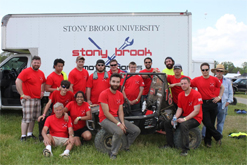 **Congratulations to SB Motorsports seniors! ** Working together to plan, design, and fabricate an original off‐road vehicle,
the main objective for this year's team was to excel in the international competition
hosted by SAE in Mechanicsville, MD, at the Budds Creek Motocross track. This event
includes specific competitive elements such as design, performance, ergonomics, and
safety. Each team is provided with an identical 10‐horsepower Briggs & Stratton engine
in order to place emphasis upon the design skills of the student participants.
**Congratulations to SB Motorsports seniors! ** Working together to plan, design, and fabricate an original off‐road vehicle,
the main objective for this year's team was to excel in the international competition
hosted by SAE in Mechanicsville, MD, at the Budds Creek Motocross track. This event
includes specific competitive elements such as design, performance, ergonomics, and
safety. Each team is provided with an identical 10‐horsepower Briggs & Stratton engine
in order to place emphasis upon the design skills of the student participants.
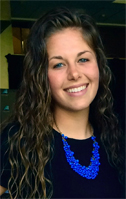
Marina Mestres is a Chemical and Molecular Engineering major, specializing in Biology. She has been
working on a senior thesis project on flame retardants under the mentorship of Dr.
Miriam Rafailovich and a senior design project about Antibody Drug Conjugates under
the mentorship of Elias Mattas, a Senior Engineer at Bristol-Meyers Squibb Company.
Marina is a recipient of the 2015 Chancellor’s award for Academic Excellence and the
2014 IWLCA Academic Honor Roll. Marina is also Captain of the Division I Women’s Lacrosse
team (Fall 2014-present), and has volunteered with Women’s Lacrosse clinics and tournaments
for young girls; she also has volunteered annually for the Walk for Beauty; and has
been involved as a Red Watch Band member, a PACK mentor for incoming freshman athletes,
and an Academic Success Tutor. Marina is a member of the American Institute of Chemical
Engineers, and was the 2012 recipient of the Organic Chemistry award. In summer 2014,
Marina interned at Arkema Inc., in Bristol PA; her future plans include taking a gap
year before pursuing a medical degree during which time she will travel to Europe
and teach English in Thailand.
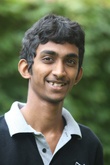 Janagan Naahanathan is a Biology major with a concentration in Neuroscience and a Chemistry minor. In
his sophomore year, Janagan joined Dr. Carrico’s lab in the Chemistry Department and
did research on modification of viral surfaces to target cancer cells. He participated
in the pilot Explorations in STEM program in Summer 2013, a collaborative program
administered by URECA, the Career Center and the Department of Technology & Society,
and sponsored by SUNY RF; and presented his research at the URECA symposium in 2014. Janagan
has served as an Organic Chemistry Teaching Assistant (2013-2014) and as a Head Undergraduate
Teaching Assistant (2014-2015). Additionally, he was the treasurer of Stony Brook
University Badminton Club and the founder of Stony Brook Tamil Language Society. Janagan
is a member of Phi Beta Kappa and the National Society of Collegiate Scholars; and
a recipient of the SUNY Chancellor’s Award for Academic Excellence. Janagan was born
in Sri Lanka and moved to the US in 2009; he plans to apply to MD programs to pursue
his ambition of becoming a surgeon.
Janagan Naahanathan is a Biology major with a concentration in Neuroscience and a Chemistry minor. In
his sophomore year, Janagan joined Dr. Carrico’s lab in the Chemistry Department and
did research on modification of viral surfaces to target cancer cells. He participated
in the pilot Explorations in STEM program in Summer 2013, a collaborative program
administered by URECA, the Career Center and the Department of Technology & Society,
and sponsored by SUNY RF; and presented his research at the URECA symposium in 2014. Janagan
has served as an Organic Chemistry Teaching Assistant (2013-2014) and as a Head Undergraduate
Teaching Assistant (2014-2015). Additionally, he was the treasurer of Stony Brook
University Badminton Club and the founder of Stony Brook Tamil Language Society. Janagan
is a member of Phi Beta Kappa and the National Society of Collegiate Scholars; and
a recipient of the SUNY Chancellor’s Award for Academic Excellence. Janagan was born
in Sri Lanka and moved to the US in 2009; he plans to apply to MD programs to pursue
his ambition of becoming a surgeon. 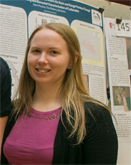 Stacey Rice is a Geosciences major, Anthropology minor, who first got started in research doing
environmental remote sensing on dust plume sources working under the direction of
Dr. Deanne Rogers (Geosciences) in spring 2014, a project she presented at the 2014
URECA Celebration. Stacey participated in a NSF funded REU (Research for Undergraduates)
last summer that involved field work in the Southern Black Mountains of Arizona focusing
on what caused the eruption of a Miocene aged supervolcano, and also included lab
work at Vanderbilt University in Nashville, TN. She presented that research at the
annual Geological Society of America conference in Vancouver, BC in October 2014. Since
last fall, Stacey has been working under the direction of Dr. Troy Rasbury in the
Facility for Isotyope Research & Student Training (FIRST lab), and recently presented
a poster on this project, "Provenance Analysis of Turkana Basin Sedimentary Horizons Using Evidence from Strontium
and Neodymium Radiogenic Isotopes," at the URECA research symposium. Stacey also participated
in a Volcanology Field Camp in Iceland in summer 2014, run by the South Dakota School
of Mines and Technology. In addition, Stacey has been active as a member of the Undergraduate
Anthropological Society, as well as the Undergraduate Geology club for which she served
as Vice President and President (in fall 2012 and spring 2013). Stacey has also served
as a Seal Walk volunteer in Cupsogue Beach, and as a research assistant for the Seatuck
Envrionmental Association of East Islip. Following graduation, Stacey will be starting
an internship with the National Park Service at Delaware Water Gap National Recreation
Area as a GIS Technician.
Stacey Rice is a Geosciences major, Anthropology minor, who first got started in research doing
environmental remote sensing on dust plume sources working under the direction of
Dr. Deanne Rogers (Geosciences) in spring 2014, a project she presented at the 2014
URECA Celebration. Stacey participated in a NSF funded REU (Research for Undergraduates)
last summer that involved field work in the Southern Black Mountains of Arizona focusing
on what caused the eruption of a Miocene aged supervolcano, and also included lab
work at Vanderbilt University in Nashville, TN. She presented that research at the
annual Geological Society of America conference in Vancouver, BC in October 2014. Since
last fall, Stacey has been working under the direction of Dr. Troy Rasbury in the
Facility for Isotyope Research & Student Training (FIRST lab), and recently presented
a poster on this project, "Provenance Analysis of Turkana Basin Sedimentary Horizons Using Evidence from Strontium
and Neodymium Radiogenic Isotopes," at the URECA research symposium. Stacey also participated
in a Volcanology Field Camp in Iceland in summer 2014, run by the South Dakota School
of Mines and Technology. In addition, Stacey has been active as a member of the Undergraduate
Anthropological Society, as well as the Undergraduate Geology club for which she served
as Vice President and President (in fall 2012 and spring 2013). Stacey has also served
as a Seal Walk volunteer in Cupsogue Beach, and as a research assistant for the Seatuck
Envrionmental Association of East Islip. Following graduation, Stacey will be starting
an internship with the National Park Service at Delaware Water Gap National Recreation
Area as a GIS Technician.
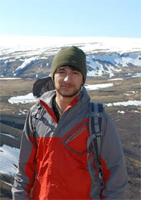
Sam Rind is a physics major who has been doing research on quantum homodyne tomography and
coherent state quantum process tomography for a little over a year, in the Quantum
Information Technology Laboratory of Dr. Eden Figueroa. He has made substantive contributions
to the lab, which has an upcoming publication showing how phase shifts in rubidium
87 can be accurately controlled, measured, and predicted using only optical methods
for use as a quantum logic gate. Sam also worked previously under the mentorship of
Dr. Alan Calder on developing methods for large scale computing from June 2012 to
June 2013, and has extensive programming experience. Sam has presented previously
at the URECA Symposium, and been featured in presentations at the Latin America Optics
& Photonics Conference and QCMC. He has also been involved in Stony Brook Crew and
enjoys marathons on Netflix as well as on foot and will be attending Technische Universität Wien in Vienna in the fall.
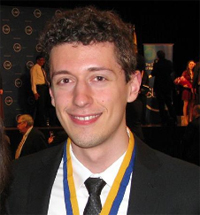 Matthew Sacco is an English major with a minor in classical civilizations. He is the founder of
Students United for Action (SUFA) a student activist organization, as well as Light
in the Dark, an award-winning sexual assault awareness campaign. His efforts have
been recognized by Newsday, Andrew Cuomo, and most recently Kirsten Gillibrand, by
whom he was invited to attend an upcoming panel discussion on sexual assault in public
universities. During his undergraduate career, he has committed to two major research
projects. His first, conducted under the guidance of Professor Gallya Lahav in the
political science department, was about the European Union's response to the Syrian
refugee crisis, an abstract for which was accepted for presentation at the Carnegie
Council for Ethics in International Affairs' first student research conference. His
English honors thesis on the confluence of form and technique in American and Palestinian
poetry, sponsored by Professor Peter Manning, was presented at URECA in the spring
of 2015. He is a 2015 recipient of the SUNY Chancellor's Award for Student Excellence,
and the Lillian E. Kahn award. He hopes to continue his research on Syrian refugees
with a non-profit or NGO while applying to law school.
Matthew Sacco is an English major with a minor in classical civilizations. He is the founder of
Students United for Action (SUFA) a student activist organization, as well as Light
in the Dark, an award-winning sexual assault awareness campaign. His efforts have
been recognized by Newsday, Andrew Cuomo, and most recently Kirsten Gillibrand, by
whom he was invited to attend an upcoming panel discussion on sexual assault in public
universities. During his undergraduate career, he has committed to two major research
projects. His first, conducted under the guidance of Professor Gallya Lahav in the
political science department, was about the European Union's response to the Syrian
refugee crisis, an abstract for which was accepted for presentation at the Carnegie
Council for Ethics in International Affairs' first student research conference. His
English honors thesis on the confluence of form and technique in American and Palestinian
poetry, sponsored by Professor Peter Manning, was presented at URECA in the spring
of 2015. He is a 2015 recipient of the SUNY Chancellor's Award for Student Excellence,
and the Lillian E. Kahn award. He hopes to continue his research on Syrian refugees
with a non-profit or NGO while applying to law school.
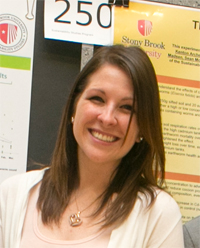
Jacquelyn Taylor is a psychology major with a concentration in Biology and Chemistry. She has been
a part of the ecotoxicology lab under the direction of Dr. Sharon Pochron since the
summer of 2014 and has been a team leader for the lab since fall 2014. This lab was
of high interest to her because of its focus on the effects that chemicals have on
the environment and its organisms. Jacquelyn has also been a part of the health psychology
lab under the investigator Dr. Anne Moyer since fall 2014 researching medical decision-making.
Throughout her time here at Stony Brook, Jacquelyn has been a part of the theater
club, interned at Suffolk County Treatment Alternatives for Safer Communities program
through Education and Assistance Corporation, embarked on a medical mission through
Global Medical Brigades to Ghana, Africa, interned at Pediatric Professional Care,
and is also a proud employee at John T. Mather Memorial Hospital within the patient
access department. Following graduation, Jacquelyn plans on continuing to lead the
ecotoxicology lab while applying to higher educational programs with dreams to eventually
research how the components of our environment impact overall human health with a
strong focus on oncology.
Below are excerpts of their conversations with Karen Kernan, URECA Director.
Karen. What advice about research do you have for other undergrads?
 Julia. Research is a time commitment that you must be willing to make, but something I
found to be completely worth the time and effort. It allows you to apply what you
learn in your classes to a real-life setting, and in that way, truly understand the
material. You must be dedicated and not let the failures deter you--oftentimes, it's
only through the failures that you get a true understanding of your project. Also,
never be afraid to ask questions and ask for help! . . . For those who are looking
to get involved with research, I would definitely suggest showing a true interest
in a specific lab's research. One way to do this is through the on-campus science
journal, the Young Investigators Review. Perhaps by interviewing a PI of interest
or writing your own article about a topic you're passionate about, you can demonstrate
your own passion for that scientific field to the lab head!
Julia. Research is a time commitment that you must be willing to make, but something I
found to be completely worth the time and effort. It allows you to apply what you
learn in your classes to a real-life setting, and in that way, truly understand the
material. You must be dedicated and not let the failures deter you--oftentimes, it's
only through the failures that you get a true understanding of your project. Also,
never be afraid to ask questions and ask for help! . . . For those who are looking
to get involved with research, I would definitely suggest showing a true interest
in a specific lab's research. One way to do this is through the on-campus science
journal, the Young Investigators Review. Perhaps by interviewing a PI of interest
or writing your own article about a topic you're passionate about, you can demonstrate
your own passion for that scientific field to the lab head! Janagan. Research helps you to learn a lot more than the classroom learning. It deepens your
knowledge by introducing to the reality. I had the opportunity to work in an Organic
Chemistry lab, where I found out that not all the reactions you learned in theory
work in environmental settings. You have to modify them to accommodate the environmental
limitations. ...These activities forced me to read a ton of papers, which helped me
to exponentially expand my Chemistry knowledge. I believe that every student should
participate in some kind of research during their career. This opportunity would definitely
help them to grow intellectually and personally.
Janagan. Research helps you to learn a lot more than the classroom learning. It deepens your
knowledge by introducing to the reality. I had the opportunity to work in an Organic
Chemistry lab, where I found out that not all the reactions you learned in theory
work in environmental settings. You have to modify them to accommodate the environmental
limitations. ...These activities forced me to read a ton of papers, which helped me
to exponentially expand my Chemistry knowledge. I believe that every student should
participate in some kind of research during their career. This opportunity would definitely
help them to grow intellectually and personally. 
Sai Saroja. The biggest advice I can give to other undergraduates who are interested in research
is that it is never too early to get your hands on it! (I started volunteering in
Dr. Wollmuth’s lab my first week of freshman year). There is a wide array of research
opportunities here within every department which gives students a chance to explore
and finally choose something that they are passionate about. Also, remember to value
the time and effort that your mentor spends in teaching you protocols, lab techniques,
the science behind your project and most importantly the fundamentals of the scientific
method. Mentors are looking for students who are willing to make a time commitment
and who are mainly enthusiastic about their research even if it requires some trouble
shooting to move the project along!
Karen. How has doing research prepared you for your future career?

Marina. I highly suggest getting involved in research at some point in your undergraduate career. Not only will it help you to decide your future path, based on your enthusiasm towards research in the end, but also it serves as an excellent learning experience and opportunity to work closely with both a professor and graduate students.

Michael. I have always wanted to be a weather forecaster. Similar to a researcher, a weather forecaster is constantly making hypotheses about the atmosphere and awaiting results. One of the big differences is that as a forecaster, your results come within a few hours or a few days, but when the results contradict your hypothesis, very little can be learned. In research, more time and effort can be allocated toward answering questions about the atmosphere. Although the results sometimes take weeks, months, or even years to be developed, they can be much more rewarding than what a forecaster may discover about the atmosphere. Atmospheric research is critical for the improvement of the forecast community, and that's really what motivates me to do research.
Karen. What have you learned from your interactions with your mentor and colleagues in your lab?

Jackie. I have learned that your colleagues become your role models by inspiring you with
all of their great accomplishments that ultimately leaves the desire to be as great
as them. I have also learned that your mentor is the one that shows you your true
potential of greatness and hands you the opportunity to test your capabilities. I
wouldn’t have become the student or ambitious person that I am without Dr. Sharon
Pochron and all of those involved with the lab. Thank you all.

Stacey. Interacting with Troy and other undergraduate and graduate students in the lab has
showed me that research is a constant learning process. I knew little about isotope
geochemistry when first joining the FIRST lab, but after just nine months I have a
better understanding of how we can use stable isotopes to investigate the ages of
rocks and geologic processes.

Matthew. Doing research was possibly the most meaningful aspect of my undergraduate education. You can be proud of excelling in a class, but you are doing so within parameters already laid out for you, so there isn't much by way of creativity there. Doing research, on the other hand, is more or less the process of conceiving and sustaining the growth of an idea that came out of your head, so the experience becomes much more personal and much more rewarding because of that.
 David. Research allowed me to engage with the information taught in the classroom in a
novel way. I found myself imagining what methods researchers would have used to arrive
at their data, and how they would design experiments to solve potentially unanswered
questions. Research also gave me a greater appreciation for amount of work scientists
undergo; before I worked in a lab, creating a strain or purifying a protein meant
little to me, but now I know how even the simplest sounding procedure can take months
to years of hard work.
David. Research allowed me to engage with the information taught in the classroom in a
novel way. I found myself imagining what methods researchers would have used to arrive
at their data, and how they would design experiments to solve potentially unanswered
questions. Research also gave me a greater appreciation for amount of work scientists
undergo; before I worked in a lab, creating a strain or purifying a protein meant
little to me, but now I know how even the simplest sounding procedure can take months
to years of hard work.  Cassandra. It has given me hands on experience ...I have learnt so many lab techniques that either
are not taught or hard to learn in a normal lab class with lots of other students.
It has also given me insight as to what conducting research is like and hopefully
this will prepare me for my future career. It has been a great experience for me and
has definitely massively enhanced my education. As well as all of the practical skills
I have learnt , it has also taught me to work more independently.
Cassandra. It has given me hands on experience ...I have learnt so many lab techniques that either
are not taught or hard to learn in a normal lab class with lots of other students.
It has also given me insight as to what conducting research is like and hopefully
this will prepare me for my future career. It has been a great experience for me and
has definitely massively enhanced my education. As well as all of the practical skills
I have learnt , it has also taught me to work more independently. Juan. Being involved in research has allowed me to take my education to the next level
by giving me the chance to apply what I have learned in class to a hands-on real world
problem. My research as part of the Stony Brook Motorsports team has given me the
opportunity to apply engineering theory to a project that I am very passionate about,
fueling a deep interest in automotive research and development with an extremely challenging
and equally rewarding experience.
Juan. Being involved in research has allowed me to take my education to the next level
by giving me the chance to apply what I have learned in class to a hands-on real world
problem. My research as part of the Stony Brook Motorsports team has given me the
opportunity to apply engineering theory to a project that I am very passionate about,
fueling a deep interest in automotive research and development with an extremely challenging
and equally rewarding experience.
Samuel. I feel that I learned more about physics and the process of which it is done in Professor Figueroa's lab than any class I have taken...There is no class in Stony Brook that can give you the same satisfaction as successful lab work. My favorite aspect is the hands on approach to learning. You are not just learning theory, you are learning how it is implemented in real experiments.
